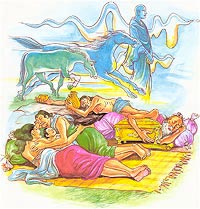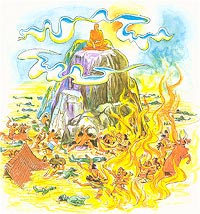07 01 2012 LESSON 487 Dhammapada
Verse 29 Dvesahayakabhikkhu Vatthu Appamatto pamattesu
suttesu bahujagaro
abalassa mva sighasso
hitva yati sumedhaso.1
Verse
29 Mindful amongst the negligent, highly
vigilant amongst the drowsy, the man of wisdom advances like a race-horse,
leaving the jade behind.
Bound with the bondage of
craving, their minds smitten with becoming & non-, they are bound with the
bondage of Mara — people with no safety from bondage, beings going through the
wandering-on, headed for birth & death. While those who’ve abandoned
craving, free from the craving for becoming & non-, reaching the ending of
fermentations, though in the world, have gone beyond.
Please download:
http://www.archive.org/details/Ajahn-Suthep-Awareness-and-Mindfulness
for
Ajahn Suthep: Awareness and Mindfulness Make it Possible (2009)
FREE ONLINE eNālandā Research & Practice
UNIVERSITY &
BUDDHIST GOOD NEWS LETTER through Through http://sarvajan.ambedkar.org
THE BUDDHIST ON LINE GOOD
NEWS LETTER
COURSE PROGRAM
LESSON
487
Practice a Sutta a Day
Keeps Dukkha Away

Verse
29. The Mindful One Is Way Ahead Of Others
Among
the heedless, heedful,
among the sleepy, wide awake.
As the swift horse outruns a hack
so one of good wisdom wins.
Explanation:
The extremely wise individual of deep wisdom is always alert and mindful. He is
therefore like a wide-awake individual among those who are deep in sleep. That
wise person, who possesses supreme insight overtakes in spirituality all those
ordinary masses, just as a fast horse overtakes a weak one.
Dhammapada Verse 29
Dvesahayakabhikkhu Vatthu
Appamatto
pamattesu
suttesu bahujagaro
abalassa mva sighasso
hitva yati sumedhaso.1
Verse
29: Mindful amongst the negligent, highly vigilant amongst the drowsy, the man
of wisdom advances like a race-horse, leaving the jade behind.
1. sumedhaso:
the wise one: the wise one advances steadily until he realizes Magga, Phala and
Nibbana, leaving the negligent ones behind in the round of rebirths (samsara).
The
Story of the Two Companion Bhikkhus
While
residing at the Jetavana monastery, the Buddha tittered Verse (29) of this
book, with reference to two bhikkhus, who were friends.
Two
bhikkhus, after obtaining a subject of meditation from the Buddha, went to a
monastery in the forest. One of them, being negligent, spent his time warming
himself by the fire and talking to young novices throughout the first watch of
the night, and generally idling away his time. The other faithfully performed
the duties of a bhikkhu. He walked in meditation during the first watch, rested
during the second watch and again meditated during the last watch of the night.
Thus, being diligent and ever mindful, the second bhikkhu attained arahatship
within a short time.
At the
end of the rainy season (vassa) both of them went to pay obeisance to
the Buddha, and the Buddha asked them how they had spent their time during the
vassa. To this, the lazy and negligent bhikkhu answered that the other bhikkhu
had been idling away his time, just lying down and sleeping. The Buddha then
asked, “But, what about you?” His reply was that he generally
sat warming himself by the fire during the first watch of the night and then
sat up without sleeping. But the Buddha knew quite well how the two bhikkhus
had spent their time, so he said to the idle one: “Though you are lazy
and negligent you claim to be diligent and ever mindful; but you have made the
other bhikkhu appear to be lazy and negligent though he is diligent and ever
mindful. You are like a weak and slow horse compared to my son who is like a
strong, fleet-footed horse.”
Then
the Buddha spoke in verse as follows:
|
Verse 29: Mindful |
§ 58. {Iti 3.9; Iti 50}
This
was said by the Blessed One, said by the Arahant, so I have heard: “There are these three cravings. Which
three? Craving for sensuality, craving for becoming, craving for non-becoming.
These are the three cravings.”
Bound with the bondage of
craving, their minds smitten with becoming & non-, they are bound with the
bondage of Mara — people with no safety from bondage, beings going through the
wandering-on, headed for birth & death. While those who’ve abandoned
craving, free from the craving for becoming & non-, reaching the ending of
fermentations, though in the world, have gone beyond.
06 01 2012 LESSON 486 Verse 28 The Sorrowless View The World Mahakassapatthera Vatthu
Pamadam
appamadena
yada nudati pandito
pannapasadamaruyha
asoko sokinim pajam
pabbatatthova bhumatthe
dhiro1 bale2 avekkhati.
Verse 28: The wise one dispels negligence by
means of mindfulness; he ascends the tower of wisdom and being free from sorrow
looks at the sorrowing beings. Just as one on the mountain top looks at those
on the plain below, so also, the wise one (the arahat) looks at the foolish and
the ignorant (worldlings).
His fermentation of sensuality ended, his ignorance washed away,
his fermentation of becoming exhausted: one totally released, acquisition-free,
bears his last body, having conquered Mara along with his mount.
FREE ONLINE eNālandā Research & Practice
UNIVERSITY &
BUDDHIST GOOD NEWS LETTER through Through http://sarvajan.ambedkar.org
THE BUDDHIST ON LINE GOOD NEWS LETTER
COURSE PROGRAM
LESSON
486
Practice a Sutta a Day Keeps Dukkha Away

Verse 28. The Sorrowless View The World
When one who’s wise does drive away
heedlessness by heedfulness,
having ascended wisdom’s tower
steadfast, one surveys the fools,
griefless, views the grieving folk,
as mountaineer does those below.
Explanation: The wise person is always
mindful. Through this alertness he discards the ways of the slothful. The wise
person ascends the tower of wisdom. Once he has attained that height he is
capable of surveying the sorrowing masses with sorrowless eyes. Detached and
dispassionate he sees these masses like a person atop a mountain peak,
surveying the ground below.
Dhammapada Verse 28
Mahakassapatthera Vatthu
Pamadam appamadena
yada nudati pandito
pannapasadamaruyha
asoko sokinim pajam
pabbatatthova bhumatthe
dhiro1 bale2 avekkhati.
Verse 28: The wise one dispels negligence by
means of mindfulness; he ascends the tower of wisdom and being free from sorrow
looks at the sorrowing beings. Just as one on the mountain top looks at those
on the plain below, so also, the wise one (the arahat) looks at the foolish and
the ignorant (worldlings).
1. dhiro: the wise one; in this
context, the arahat.
2. bile: the foolish; in this context,
the worldings.
The Story of Thera Mahakassapa
[ Read longer version of story here ]
While residing at the Jetavana monastery, the
Buddha uttered Verse (28) of this book, with reference to Thera Mahakassapa.
On one occasion, while Thera Mahakassapa was
staying at Pipphali cave, he spent his time developing the mental image of
light (aloka kasina) and trying to find out through Divine Vision,
beings who were mindful and beings who were negligent, also those who were
about to die and those who were about to be born.
From his monastery, the Buddha saw through his
Divine Vision what Thera Mahakassapa was doing and wanted to warn him that he
was wasting his time. So he sent forth his radiance and appeared seated before
the thera and exhorted him thus: “My son Kassapa, the number of births
and deaths of beings is innumerable and cannot be counted. It is not your
concern to count them; it is the concern only of the Buddhas.”
Then the Buddha spoke in verse as follows:
|
Verse 28. The wise one dispels negligence by means of |
§ 57. {Iti 3.8; Iti 49}
This was said by the Blessed One, said by the
Arahant, so I have heard: “There are these three fermentations.
Which three? The fermentation of sensuality, the fermentation of becoming, the
fermentation of ignorance. These are the three fermentations.”
His fermentation of sensuality ended, his ignorance washed away,
his fermentation of becoming exhausted: one totally released, acquisition-free,
bears his last body, having conquered Mara along with his mount.